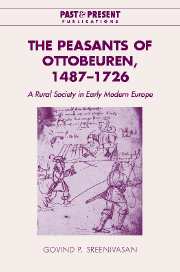Book contents
- Frontmatter
- Contents
- List of figures
- List of maps
- List of tables
- Acknowledgements
- Note on weights, measures, and currencies
- Map 1 Southern Germany, c. 1620
- Map 2 The lands of the monastery of Ottobeuren, 1620
- Introduction
- 1 Right and might (c. 1480–c. 1560)
- 2 The discrete society (c. 1480–c. 1560)
- 3 A crisis of numbers? (c. 1560–c. 1630)
- 4 Integrity and the market (c. 1560–c. 1630)
- 5 Living on borrowed time (c. 1560–c. 1630)
- 6 To empty and to refill (c. 1630–c. 1720)
- Conclusion
- Bibliography
- Index of places
- General index
- Past and Present Publications
4 - Integrity and the market (c. 1560–c. 1630)
Published online by Cambridge University Press: 21 July 2009
- Frontmatter
- Contents
- List of figures
- List of maps
- List of tables
- Acknowledgements
- Note on weights, measures, and currencies
- Map 1 Southern Germany, c. 1620
- Map 2 The lands of the monastery of Ottobeuren, 1620
- Introduction
- 1 Right and might (c. 1480–c. 1560)
- 2 The discrete society (c. 1480–c. 1560)
- 3 A crisis of numbers? (c. 1560–c. 1630)
- 4 Integrity and the market (c. 1560–c. 1630)
- 5 Living on borrowed time (c. 1560–c. 1630)
- 6 To empty and to refill (c. 1630–c. 1720)
- Conclusion
- Bibliography
- Index of places
- General index
- Past and Present Publications
Summary
The hamlet of Osterberg lay at the southeastern rim of the monastery lands, just short of the border with the Princely Abbacy of Kempten. So close, indeed, was the power of the Prince-Abbot that until 1564, when a treaty between the two monasteries altered their status, every single one of the settlement's fifty-seven inhabitants was a Kempten serf. Founded (like so many of the Ottobeuren hamlets) sometime in the later fifteenth century, Osterberg shared the experience of population growth in the following century, swelling from eight households in 1548 to eleven in 1564 as the children of older residents married and settled down next to their parents. But thereafter the pattern changed, for by 1587 the hamlet had shrunk back to seven households and by 1602 to four. It was not a problem of food supply; despite devastating hailstorms in 1569, 1597, and 1603, Osterberg's average tithe payment rose by some 40 percent between the early 1570s and the early 1620s.Nevertheless, by the late sixteenth century it is possible to document the emigration of the young from every household in the settlement. The age-old rules of family succession had clearly undergone a series of profound changes, and there is no better example of this than the Münch family.
Balthas Münch of Osterberg succeeded his father, Michael, sometime between 1564 and 1583.
- Type
- Chapter
- Information
- The Peasants of Ottobeuren, 1487–1726A Rural Society in Early Modern Europe, pp. 155 - 203Publisher: Cambridge University PressPrint publication year: 2004



